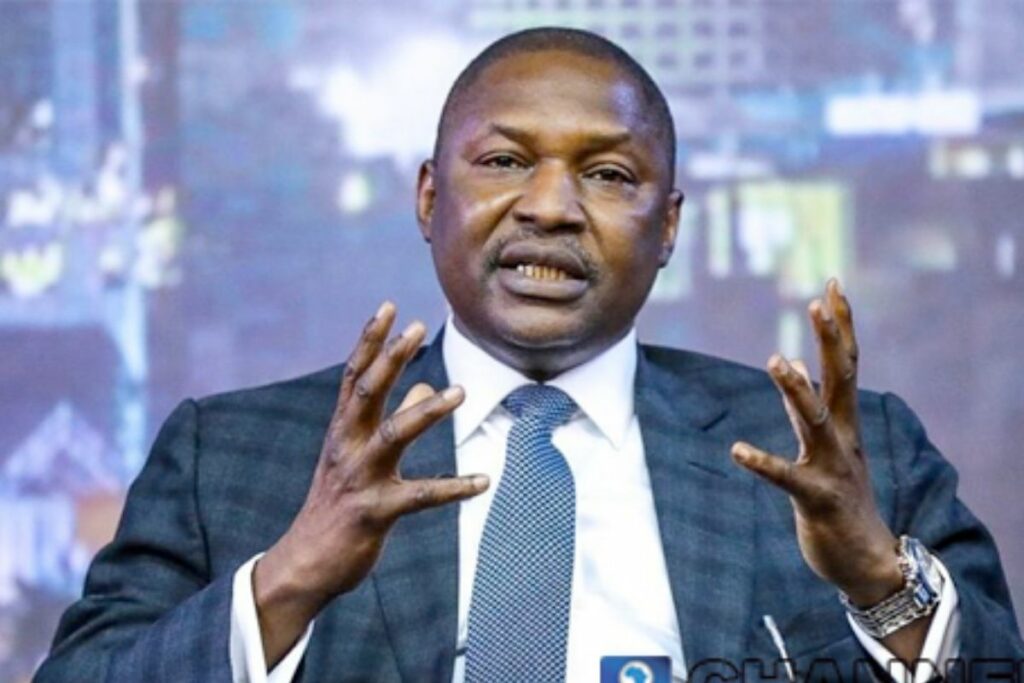The Attorney-General of the Federation, Abubakar Malami (SAN), said the demarcation of the Bakassi peninsula and adjoining boundaries between Nigeria and Cameroon has reduced from 13 to three
Malami stated this on Thursday during the 34th session of the mixed commission Cameroon-Nigeria, in Abuja, organised by the National Boundary Commission.
The minister commended the Chairman of the Mixed Commission, Mahamat Saleh, for fronting the landmark achievements of the construction of the lot 6, A, B, and C.
He said under the leadership and guidance of Saleh, the CNMC has made rapid progress and recorded landmark achievements in the implementation of its mandate within the shortest period of time.
The AGF said, “The just&concluded pillar construction exercise, plot six A, B and C, on the Atlantical Mountain is a milestone achievement in view of the difficulty in accessing the area.
“It is also on record that under your able leadership we jointly resolved the challenges previously associated with some of the major disagreement areas we inherited and these disagreements were reduced as the number was reduced from 13 to just three as of today.
“Mr. Chairman, it is to your credit that we have also improved on the frequency of our meetings. We had the 33rd session of the CNMC in November, 2021 and here we are today having the 34th session barely just a nine month period of time.
“This is indeed a great achievement, compared to the about seven years period between 32nd and 33rd sessions, which indeed could only hold after a span of seven years. Your amiable disposition, your Excellency, capacity to deal with intricate issues and delegate determination to achieve a set goals are immensely applauded by Nigeria, and I believe Cameroon as well.
“Accordingly, we must, therefore, commend your services to the continent and to our countries.
“I wish to also recognise and express gratitude to our two presidents, and indeed the Secretary General of the United Nation, for the encouraging financial support accorded the exercises.
“The enormous financial commitments to support the military personnel in their works are recognised and appreciated as well. These no doubt boosted the morale of the security personnel to put in their best in the execution of the hard exercise.”
The Director-General, National Boundary Commission, Adamu Adaji, said that the session was for the commission to place pillars that would clearly define the boundaries between the duo countries.
“The exercise is for us to place pillars that will define the boundaries in the entire structure of the 2100 pillars, just like we have defined close to about 2000. The remaining sector, we want to make sure we also emplace pillars and this pillar emplacement programme is continuous. We just finished lot size and we will continue with lot seven and eight”, he said.
He said that the three remaining disagreement areas are, “the room Sookie; then there is the issue of one of the pillars known as Anglo German pillars; the other one is the popular cuja community around Adamawa state. Now the issues had been the difficulties by the parties to agree on the correct interpretation of the ICJ documents.”
Adaji said, “Rum Suki the ICJ had ruled that Nigeria’s position was more accepted but our brothers want a situation whereby their own views will also be tabled for further negotiations and specials.
“We are saying, no, let’s stick to the ICJ judgement for now. In the case of pillar 8, we have always argued that there was a mistake in the coordinates of that point that was given and we have requested our counterparts, our Cameroonian brothers to still reason with us as we have seen in previous cases where there had been mistakes in the coordinates given by the ICJ because the coordinates is supposed to guide you to a point, where that point is not where you expect to be, you will see an error.”
